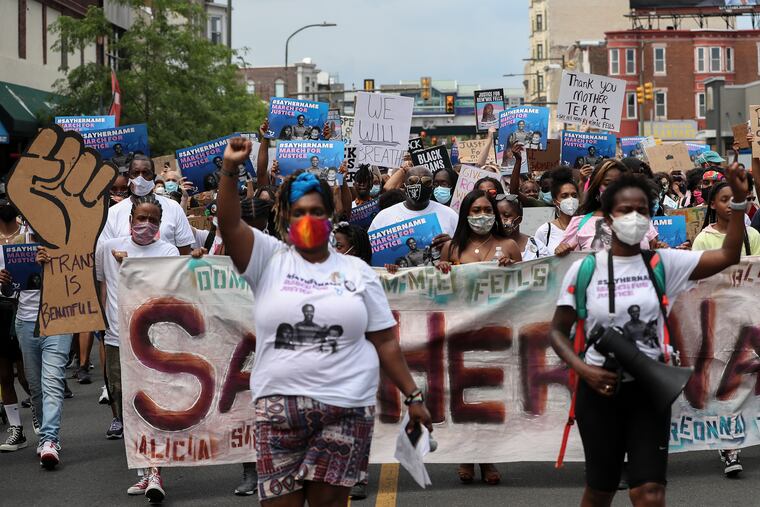As Philadelphia mourns Dominique ‘Rem’mie’ Fells, Black trans lives still matter | Opinion
Black transgender murders are a national and global problem that recent protests have highlighted.

I remember Nizah Morris, elegantly moving through what is called Philly’s Gayborhood. She was a beautiful Black transgender woman. I recall her kindness: “Hey, baby,” she would say, greeting you as she passed by. Almost 20 years ago, I stumbled upon the neighborhood and was captivated by the boldness and beauty of Blackness — hers especially. But two years later, Morris, last seen with cops on Dec. 22, 2002, died from a head injury on Dec. 24, 2002, at Jefferson Hospital.
When I came out, it was Black transgender women who taught me how to be intimate, how to love, and what to look out for to protect myself. Black transgender women are the mothers not just of movements (including the turning point at Stonewall) and ballroom houses, but mothers, too, of a story not often amplified by society. They hold the histories of our queer Black communities. Without their memories, the transphobic dominant narrative — that gender is sex and assigned at birth — would win.
This month, Philadelphia lost another Black trans woman. Dominique Rem’mie Fells’ body was found in the river near Bartram’s Garden on June 8, and the brutal details were reported nationally. Now the city’s first collective memory of Rem’mie will be the disturbing details of her murder and not her powerful presence. Rem’mie was the beautiful daughter of Terri Edmonds and eldest of three, older sister to Desiree and Dior. Rem’mie loved fashion, modifying clothing, organizing fashion shows, and glamorously walking runways. She was more than the brutalization that befell her.
Black transgender murders are a national and global problem that recent protests have highlighted. A #SayHerName march drew hundreds of attendees, and paid respects to Fells, on June 20 in West Philadelphia. In New York, organizers said 15,000 people gathered for the Brooklyn Liberation march for Black trans lives. Joshua Allen, a nonbinary artist and activist, wrote for Vox about the event: “As a Black gender-nonconforming person from Brooklyn, this action was personal for me,” contending that “for decades, the existence of trans people was ignored and erased” from American society.
“If we don’t uplift Black transgender women when they are alive, we have contributed to a culture that makes their violent deaths possible.”
The data support Allen’s statement. The murders of Black transgender people remain disproportionate and horrendous. According to Philadelphia’s Morris Home — which uses a harm-reduction approach to support transgender and gender-nonconforming individuals’ recovery from addiction and other issues, and was named for Nizah Morris — 2020 is on track to be the deadliest year ever for transgender people in the United States. In a statement after Fells’ death, Morris Home noted that at least 15 transgender individuals in the U.S. have been lost to violence this year, with 73% of these deaths among transgender women of color, and 47% Black trans women specifically.
The Black Lives Matter movement only gets to collective freedom when we show up for the most vulnerable targets of oppressive systems, like Black trans women. Otherwise we are not in service of Black liberation.
Black Lives Matter is a demand, carrying a proclamation and direct response to the myriad violence that Black people experience at the behest of the state, a long-idealized police culture, and our socialization within the racial hierarchy built by colonization.
We must not only #SayHerName, recognizing the Black women we’ve lost — but we must dismantle the patriarchal system that engenders intimate-partner and other violence, which claims so many of our sisters. We have to rage for Black transgender women, because if we aren’t shaking the grounds on which they died, we don’t believe in Black lives. If we don’t march for their lives, we are sidestepping their humanity. If we don’t uplift Black transgender women when they are alive, we have contributed to a culture that makes their violent deaths possible.
Black Trans lives matter.
Abdul-Aliy Muhammad is an organizer and writer born and raised in West Philadelphia. @MxAbdulAliy